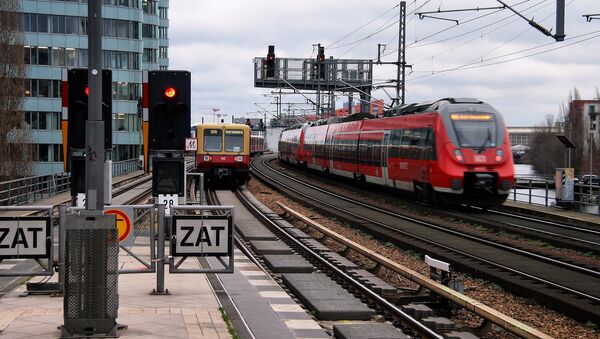Two in three long-distance trains and hundreds of commuter services were cancelled after the small but powerful GDL union extended its open-ended strike to passenger routes. Freight trains were halted on Tuesday.
— Anne Laumen (@AnneLaumen) May 20, 2015
10h shift today. Instead of 20min it took me 1:20 due to the strike. No sympathy for the GDL madmen holding a nation hostage. #gdlstreik
— Mr. Vulpone (@MrVulpone) May 20, 2015
The walkout is the ninth in 10 months to hit rail operator Deutsche Bahn. The scope of the action has alarmed politicians, businesses and other unions in a country known for relatively harmonious labour relations. It drew sharp criticism from both the BDA employers association and the DGB union umbrella organization.
"To put it mildly, this is going too far," DGB head Reiner Hoffmann told the Tagesspiegel newspaper, questioning the readiness of GDL chief Claus Weselsky to find a compromise deal.
Longest Strike in 21 Years
The BDA said the damage caused to the economy overall was "completely disproportionate" with the steel, engineering and car sectors among those hardest hit because of their reliance on freight services.
Next German train strike will be longer, may hit holiday weekends http://t.co/lAd1kGXjqd pic.twitter.com/ppv189NO18
— Strike Informer (@strikeinformer) May 19, 2015
"The GDL is taking Deutsche Bahn customers hostage for egoistical reasons to get more power," said BDA president Ingo Kramer. GDL, a member of the DGB, has been trying to poach members from other unions and strengthen its hand.
The GDL union has not said when the stoppage will end, just that it will be longer than the last strike which lasted nearly a week and was the longest in Deutsche Bahn's 21-year history.
#Train strike: GDL boss Weselsky stirred at basic consensus of Germany AG — http://t.co/3cjiyySuTU pic.twitter.com/fh97Me1G5L
— Panteres.com (@PanteresNEWS) May 20, 2015
Reuters reported analysts saying a 10-day strike could shave 0.1 of a percentage point off gross domestic product growth in the second quarter. The GDL union, with 20,000 members, wants a 5 percent pay rise for its members, a shorter working week and the right to represent other workers in the company, such as train stewards.
Deutsche Bahn, with 200,000 employees, has offered a 4.7 percent pay rise plus a one-off payment of 1,000 euros, but it has refused to let the GDL negotiate for other workers. Politicians, including Chancellor Angela Merkel, have urged the two parties to enter mediation.



